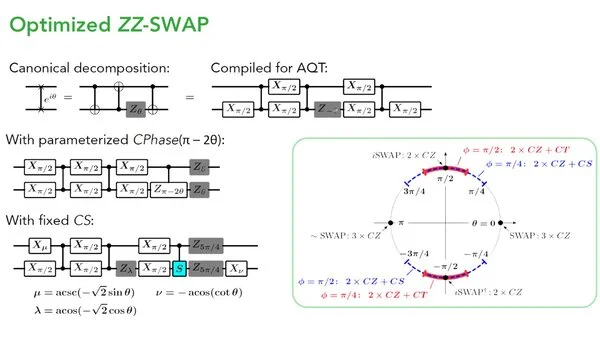Researchers have demonstrated how a smart compiler designed specifically for superconducting quantum hardware can optimize circuits and networks while also executing less error-prone quantum algorithms such as the Quantum Approximate Optimization Algorithm (QAOA), which is critical for quantum computing.
A collaboration between Lawrence Berkeley National Laboratory’s Advanced Quantum Testbed (AQT) and Chicago-based Super.tech demonstrated how to optimize the execution of the ZZ SWAP network protocol, which is important in quantum computing. The team also presented a new quantum error mitigation technique that will improve the network protocol’s implementation in quantum processors. The experimental data was published in Physical Review Research in July, and more pathways to implement quantum algorithms using gate-based quantum computing will be added in the near future.
A Smart Compiler for Superconducting Quantum Hardware
Quantum processors with two- or three-dimensional architectures have limited qubit connectivity, which means that each qubit only interacts with a small number of other qubits. Furthermore, the information in each qubit can only exist for a limited time before noise and errors cause decoherence, limiting the runtime and fidelity of quantum algorithms. As a result, when designing and executing a quantum circuit, researchers must optimize the translation of the circuit’s abstract (logical) gates to physical instructions using the native hardware gates available in a given quantum processor. Because they consider the number of gates and operations natively supported by the hardware to perform the desired logical operations, efficient circuit decompositions reduce operating time.
SWAP gates, which exchange information between qubits, are commonly used in quantum circuits to facilitate interactions between information in non-adjacent qubits. Swaps are used to move information from one qubit to another non-adjacent qubit when a quantum device only allows gates between adjacent qubits.
Performing discrete logic operations is one of the most difficult challenges in quantum computing. Our control signals are always imperfect because they are analog and continuous. As we construct more complex quantum circuits, the software infrastructure that optimally compiles gates tailored for AQT hardware assists us in achieving higher operational fidelity.
Akel Hashim
Introducing swap gates in noisy intermediate-scale quantum (NISQ) hardware can result in significant experimental overhead. Swap gates are frequently decomposed into native gates such as controlled-NOT gates. To improve the runtime of a quantum algorithm or application, it is critical to use a smart compiler that can search for, decompose, and cancel redundant quantum gates when designing quantum circuits with limited qubit connectivity.
The research collaboration used Super.tech’s SuperstaQ software, which allowed scientists to fine-tune their applications and automate circuit compilations for AQT’s superconducting hardware, particularly for a native high-fidelity controlled-S gate, which is not available on most hardware systems. The SWAP networks can be decomposed more efficiently using this smart compiling approach with four transmon qubits than using standard decomposition methods.
Because a network of ZZ SWAP gates requires only minimal linear connectivity between qubits and no additional couplings, it provides practical benefits for the efficient execution of quantum algorithms such as the Quantum Approximate Optimization Algorithm (QAOA). QAOA approximates solutions to combinatorial optimization problems by providing a set of criteria for determining the best solution. A well-known combinatorial optimization problem that can be solved faster with QAOA using quantum circuits is the Maximum-Cut problem, which can be used to arrange hubs on a transportation grid system.

“Performing discrete logic operations is one of the most difficult challenges in quantum computing. Our control signals are always imperfect because they are analog and continuous. As we construct more complex quantum circuits, the software infrastructure that optimally compiles gates tailored for AQT hardware assists us in achieving higher operational fidelity” Akel Hashim, the experiment’s lead AQT researcher and a graduate student at the University of California, Berkeley.
“A unique feature of quantum computing is that it enables partial logic gates. This feature has no parallel in traditional boolean logic — for example, your laptop computer can’t execute 50% of an AND gate. AQT’s ability to calibrate these partial controlled-S quantum gates opened the door for us to develop a wider array of novel optimizations to squeeze the most out of the hardware,” said Rich Rines, formerly of Super.tech and currently a software engineer at ColdQuanta.
“Collaboration remotely was a key software engineering challenge for this experiment, so we iteratively developed quantum circuit optimizations informed by the custom gates calibrated by the AQT team. We optimized from start to finish by figuring out how to serialize these pulses while keeping the hardware in mind. We also discovered how to integrate open-source quantum software packages into our compiler, ensuring that our optimizations do not reinvent the wheel “said Victory Omole, a former Super.tech employee and ColdQuanta software engineer.
As part of the experiment, the team also introduced a novel technique called Equivalent Circuit Averaging (ECA), which randomized the various parameters of the SWAP networks to generate many logically equivalent circuits. ECA randomizes the decomposition of quantum circuits, mitigating the impact of systematic coherent errors — one of the most severe errors in quantum computers and widely studied at AQT.
“I proposed using Super.tech’s smart compiler to combine my previous experimental work in randomized compiling with Quantum Benchmark (acquired by Keysight) to study a new way to reduce the impact of crosstalk errors,” Hashim explained. “I would not have had this idea if I hadn’t collaborated with other researchers as part of AQT’s user program. As someone who is about to enter the workforce, networking is essential for developing a network of people I know in the field who are experts in various fields and to whom I can pitch research ideas.”
These experimental optimizations resulted in an improvement of up to 88% in the performance accuracy of QAOA. Researchers are looking to continue to explore and refine the methods in this work and apply them to other applications.
Supporting Industry Growth With An Open-Access Research Lab
AQT operates a state-of-the-art open experimental testbed based on superconducting circuits and is funded by the United States Department of Energy Office of Science Advanced Scientific Computing Research (ASCR) program. Technologies developed elsewhere can be deployed and field-tested at AQT, providing deep access to the full quantum computing stack at no additional cost.
AQT has provided Super.tech, one of several industry users, with low-level access to the hardware since the launch of its user program in 2020. Few cloud-based quantum platforms provide free access to the entire quantum computing stack as well as real-time feedback from hardware experts. Super.tech worked with AQT’s expert experimental team to figure out how to boost performance on this type of hardware.
“By revealing the inner controls of quantum hardware, AQT’s collaborative approach with users drives innovation throughout the quantum computing stack. We look forward to continuing our research collaboration with AQT, and we will continue to share these results with the scientific community by publishing our learnings,” said Pranav Gokhale, VP of Quantum Software at ColdQuanta and Super.tech former CEO and Co-Founder.













